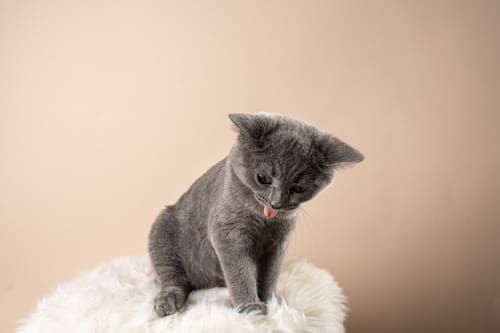Coughing in cats is a symptom that can arise from various underlying issues, ranging from minor irritations to serious health problems. Hearing your cat cough can be concerning, which is why this blog will discuss the potential reasons behind your cat’s cough, what symptoms to watch out for, and when it’s time to contact your veterinarian at Heart of Chelsea Veterinary Group. If your cat is coughing, contact us today, so our team can offer tailored advice and possible treatment.

What Are Common Causes of Cat Coughing?
Respiratory Infections
These can include viral, bacterial, or fungal infections that affect the upper or lower respiratory tract.
- Viral Infections: Feline herpesvirus and calicivirus are two common viruses that can cause coughing in cats. These viruses can lead to symptoms such as sneezing, nasal discharge, and coughing.
- Bacterial Infections: Bordetella bronchiseptica is a bacterial infection often responsible for coughing. It can spread quickly, especially in multi-cat households or shelters.
- Fungal Infections: Fungal infections, though less common, can also cause coughing. These infections typically occur when cats inhale fungal spores from the environment.
Asthma and Allergies
Feline asthma can lead to chronic coughing, wheezing, and difficulty breathing.
- Asthma: Asthma in cats is often triggered by allergens such as pollen, dust, or cigarette smoke. During an asthma attack, your cat may exhibit open-mouth breathing and appear distressed.
- Allergies: Allergies to environmental factors, certain foods, or even flea bites can cause coughing. Identifying and eliminating the allergen is crucial to alleviating your cat’s symptoms.
Foreign Objects
These objects can become lodged in the throat or airways, causing irritation and coughing.
- Inhaled Objects: Small objects like grass, hair, or debris can be inhaled and cause coughing. If your cat is coughing suddenly and persistently, it could indicate a foreign object.
- Ingested Objects: While less common, ingested objects can also cause coughing if they become stuck in the esophagus or digestive tract.
Symptoms Accompanying Cat Coughing
When trying to determine why your cat is coughing, symptoms that may accompany the cough can provide valuable clues about the underlying cause.
Nasal Discharge and Sneezing
Clear or colored discharge and frequent sneezing are common signs of upper respiratory issues.
Difficulty Breathing and Wheezing
Watch for signs such as open-mouth breathing, rapid breathing, and audible wheezing.
Lethargy and Loss of Appetite
If your cat is less active than usual and refuses to eat, it’s time to contact Heart of Chelsea Veterinary Group.
Vomiting
This is often seen when a cat coughs violently or has a foreign object lodged in the throat. If your cat is coughing and vomiting, seek veterinary care promptly.
When to Contact Heart of Chelsea Veterinary Group
While occasional coughing may not be a cause for concern, persistent or severe coughing requires veterinary attention.
- Persistent Coughing: If your cat has been coughing for more than a few days, it’s time to schedule an appointment. Chronic coughing can indicate underlying health issues that need to be addressed.
- Severe or Distressing Coughing: Coughing that is severe or appears to cause distress in your cat warrants immediate veterinary care. Signs of distress include open-mouth breathing, blue-tinged gums, and collapse.
- Accompanying Symptoms: As mentioned earlier, coughing accompanied by other symptoms such as difficulty breathing, lethargy, or vomiting should not be ignored. These symptoms can indicate serious health problems that require prompt diagnosis and treatment.
How to Prevent Cat Coughing
While some causes of coughing are unavoidable, there are steps you can take to minimize the risk and maintain your cat’s respiratory health.
- Routine Wellness Appointments: Routine veterinary check-ups are crucial for early detection and prevention of respiratory issues. Regular exams can help identify potential problems before they become severe.
- Indoor Environment: Keeping your cat indoors can reduce exposure to allergens, pollutants, and infectious agents. Ensure your home is free from cigarette smoke and regularly clean to minimize dust and allergens.
- Vaccinations: Keeping your cat up to date on vaccinations can prevent many viral and bacterial infections that cause coughing. Consult with Heart of Chelsea Veterinary Group about the appropriate vaccination schedule for your cat.
If your cat is coughing persistently, showing signs of distress, or exhibiting any of the accompanying symptoms mentioned above, contact Heart of Chelsea Veterinary Group immediately. Our experienced veterinarians are here to provide the care and support your cat needs.
Recent Posts
About Us
Heart of Chelsea Veterinary Group is more than an animal hospital; we are your partner in giving your pet a lifetime of outstanding care. Our veterinarians and team members form lasting relationships with pet owners like you to create unique, personalized experiences for all. Heart of Chelsea was founded in 1999 to provide the community with a neighborhood veterinary practice that delivers thorough, compassionate medicine and unparalleled concierge client service.


